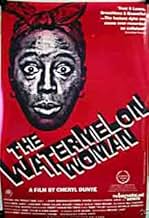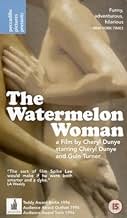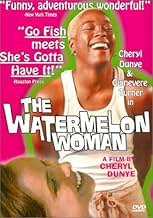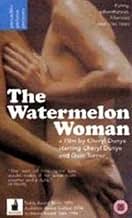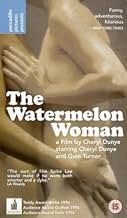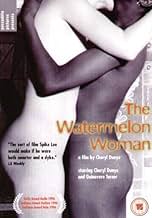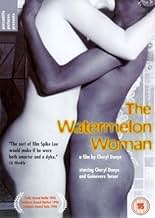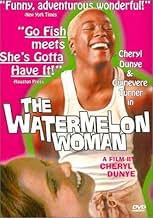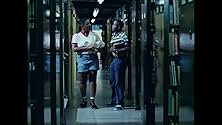AVALIAÇÃO DA IMDb
7,1/10
4,5 mil
SUA AVALIAÇÃO
Uma jovem cineasta lésbica negra investiga a vida de uma atriz negra dos anos 30 que interpretou arquétipos de 'mamãe' - um estereótipo que representa mulheres negras que trabalham em uma fa... Ler tudoUma jovem cineasta lésbica negra investiga a vida de uma atriz negra dos anos 30 que interpretou arquétipos de 'mamãe' - um estereótipo que representa mulheres negras que trabalham em uma família branca e cuidam dos filhos da família.Uma jovem cineasta lésbica negra investiga a vida de uma atriz negra dos anos 30 que interpretou arquétipos de 'mamãe' - um estereótipo que representa mulheres negras que trabalham em uma família branca e cuidam dos filhos da família.
- Direção
- Roteiristas
- Artistas
- Prêmios
- 4 vitórias no total
Cheryl Clarke
- June Walker
- (as Cheryl Clark)
Kat L Robertson
- Yvette
- (as a different name)
Avaliações em destaque
Really great movie loved the documentary style seaming with the actual film fun characters great transitions inbetween shots and enjoyed how random some of the cuts or scene transitions are
'The Watermelon Woman (1996)' is the first film to be directed by a Black lesbian filmmaker, which is hard to believe considering it came out in the late 90s. Blurring the line between fact and fiction, the feature alternates between footage supposedly shot for a documentary director Cheryl Dunye is shooting about the eponymous old Hollywood actor and narrative segments filmed with more traditional methods. The on-screen story seems to replicate the real-life story, presenting as a fictionalised version of events that must have happened prior to/ happened during production, but it's actually all carefully crafted to have this effect. That's because the entirety of the affair is fiction, an experiment designed to seem like a genuine documentary that pulls its maker into its orbit and reflects their personal journey in traditional interludes. The documentary we see is being made by Cheryl Dunye the character, but not by Cheryl Dunye the filmmaker. I already knew this going in, but I can imagine it being mind-blowing to anyone who isn't aware. That's because each and every documentary segment is crafted with such authenticity, such perfect imperfectness, such true-to-life inexperience that it feels wholly believable. Every single person who is interviewed is acting, whether they know it or not (perhaps the street interviews are real; I can't tell), and they turn in almost accidentally masterful performances. I mean, this is how you work with an amateur cast; use their rawness to your advantage, craft situations in which it's beneficial for them not to be professional and flawless and recognisable. Perhaps the acting in the definite fiction segments could have been improved from time to time, but even the occasional flubbed line or strained delivery in these sections reinforces the idea that they're being created by a bunch of the director's friends as experimental companion pieces to the documentary. The whole feature feels like a personal essay from its director, something speaking directly to you as you watch it, and it's really impressive that it feels this genuine and homemade when it's actually a meticulously crafted affair. It deals with themes of race and sexuality and representation, exploring interracial relationships (and the stigmas and stereotypes that come with them), the evolving role of women - in particular, Black women - in Hollywood (and how certain stereotypes can be important stepping stones despite being harmful overall), LGBTQIA+ filmmaking and socialising, and the concept that you have to be the change you want to see. The underlying thesis seems to be that if you want to see something represented on screen, you should make something that represents it on screen. That's exactly what Dunye has done, putting what are clearly very important aspects of her identity on display in a way that feels both vulnerable and powerful all at once. Empowerment seems to be the name of the game here, and the fantasy of the filmmaker being able to locate an idol who was living (something close to) her reality all those years earlier isn't used as a way to remind us that these things aren't as common as they should be, but instead to inspire us that one day we might be able to find real Watermelon Women in our own media. Movies like this pave the way in making that possible; the next Cheryl Dunye won't be looking at problematic Hollywood pictures to see themselves reflected in film, they'll be looking at her. This is one of those movies that it just isn't especially helpful to rate. It isn't the most exciting or engaging in-the-moment experience, but it's an incredibly rewarding one in retrospect. The more I think about it, the more I like it. It's occasionally funny, occasionally romantic, and consistently so real that it's hard to believe it's not (even if some elements of reality definitely seep into it). It's an important indie film that impresses thematically, formally and representationally, a vibrant and powerful effort that reminds you how unique and potent and inspiring movies can be. It's the kind of thing that makes you want to just grab a camera and make something. It's pretty great.
A cause for celebration, this 20th Anniversary DVD release. The Watermelon Woman was a revelation back in 1996 and it is -- shame on us -- perhaps even more to-the-point today.
Seated by myself at the Film Forum here in NYC, 1996, a gay non-Black guy, I was expecting a variation on the Melvin Van Peebles satire from the early seventies, The Watermelon Man. But a mere five minutes into The Watermelon Woman, I knew I was in the presence of something special, indeed. Here was a tsunami of vivid, fresh air.
Cheryl Dunye -- writer, director, star -- had created something utterly new. Here she was, placing a Black Lesbian at the center, unapologetic about her same-sex longing and needs, about her rich magnetic Blackness, her fierce yet tender femaleness. For me, used to seeing Lesbians or gay men like myself held up for mockery or derision or contempt, it was a revelation to see Lesbians portrayed as just part of the human tapestry, regular people making it through the day, paying bills, falling in and out of lust and love.
For that alone, The Watermelon Woman deserves high praise. But it is about so much more. For Ms. Dunye uses her Blackness to probe an America which has never come to terms with its deep racist history. Ms. Dunye confronts it with wit and candor. Her character is researching a beautiful Black actress from the 1930s, who never received a credit in her films. It's like she never existed, a mere celluloid presence, nothing more.
As she probes deeper into the actress's past, Ms. Dunye begins peeling away her own reality. As both a Lesbian and a Black woman, in an America which marginalizes Lesbians, Blacks, women. She is forced to question assumptions about what it means to be a Lesbian and both a woman and a woman of color.
And here is where The Watermelon Woman becomes as timely as it was back in 1996. For in confronting her own marginalization, Ms. Dunye makes crystal clear why today's Black Lives Matter is so important to today's America. Like any work of art -- and make no mistake, The Watermelon Woman is a work of art, indeed -- meanings change over time. And though Black Lives Matter hadn't yet become a rallying cry, its genesis is inherent in The Watermelon Woman.
Cheryl Dunye, you and The Watermelon Woman are a oner!
Seated by myself at the Film Forum here in NYC, 1996, a gay non-Black guy, I was expecting a variation on the Melvin Van Peebles satire from the early seventies, The Watermelon Man. But a mere five minutes into The Watermelon Woman, I knew I was in the presence of something special, indeed. Here was a tsunami of vivid, fresh air.
Cheryl Dunye -- writer, director, star -- had created something utterly new. Here she was, placing a Black Lesbian at the center, unapologetic about her same-sex longing and needs, about her rich magnetic Blackness, her fierce yet tender femaleness. For me, used to seeing Lesbians or gay men like myself held up for mockery or derision or contempt, it was a revelation to see Lesbians portrayed as just part of the human tapestry, regular people making it through the day, paying bills, falling in and out of lust and love.
For that alone, The Watermelon Woman deserves high praise. But it is about so much more. For Ms. Dunye uses her Blackness to probe an America which has never come to terms with its deep racist history. Ms. Dunye confronts it with wit and candor. Her character is researching a beautiful Black actress from the 1930s, who never received a credit in her films. It's like she never existed, a mere celluloid presence, nothing more.
As she probes deeper into the actress's past, Ms. Dunye begins peeling away her own reality. As both a Lesbian and a Black woman, in an America which marginalizes Lesbians, Blacks, women. She is forced to question assumptions about what it means to be a Lesbian and both a woman and a woman of color.
And here is where The Watermelon Woman becomes as timely as it was back in 1996. For in confronting her own marginalization, Ms. Dunye makes crystal clear why today's Black Lives Matter is so important to today's America. Like any work of art -- and make no mistake, The Watermelon Woman is a work of art, indeed -- meanings change over time. And though Black Lives Matter hadn't yet become a rallying cry, its genesis is inherent in The Watermelon Woman.
Cheryl Dunye, you and The Watermelon Woman are a oner!
The Watermelon Woman (1996) -
I suppose that as a homosexual white British man, I probably wasn't exactly the target audience for this Black, Lesbian film from the U. S., although that in itself goes against my belief that people should explore genres out of their comfort zone, because otherwise they will never know if there is more to life. I could certainly see the appeal of this one for some and the message it was trying to get out. I just didn't like the sex scenes very much (Eek Boobies!).
For the most part, the story was fictionalised and the title character of "The Watermelon Woman" was a vehicle to discuss the injustices of racial bigotry in the world of cinema since the dawn of it's creation and to a certain extent the rest of the time since too.
Although this film did indicate some essence of racism towards white people, for the fact that they allegedly can't understand the persecutions faced by the black community and I wondered if that was deliberate or something that was a missed irony.
The lead character Cheryl played by the writer and director Cheryl Dunye wanted to track down the movements of The Watermelon Woman's past to find out what had happened to her and she studied the golden age of cinema in order to do so. Her journey was quite interesting. I did have to wonder if the whole film might have actually been better if it was presented as a documentary, about actual, real actors of the past that weren't given their dues accordingly.
There was a mention of Hattie McDaniel included here. She was famously snubbed at the Oscars when she went to receive her award for the part of Mammy in 'Gone With The Wind' (1939) and was made to sit in another room and only allowed to enter the main area for the presentation of her statue. Her story was partly covered in the TV series 'Hollywood' (2020) and I'm sure that wasn't delivered wholeheartedly or completely truthfully, because it was a very glamourised interpretation of the early years of Hollywood anyway and it dared to conceive an idea that perhaps these prejudices and things should have been exposed much earlier for their idiocy.
I did say that it might have worked better as a documentary, because I could see that Cheryl was obviously passionate about her message, but the acting really wasn't the best and the film quality was quite poor too, not even just the bits where it was filmed on an old video camera. There were some cheap and odd editing choices and many of the characters were a tad unfriendly while others were perfectly odd including the "Professor" and the C. L. I. T. volunteer (Sarah Schulman).
The style of it actually reminded me of 'Tangerine' (2015), a trans/drag film which was filmed entirely on a smart phone. There were similarities in the direction and the attempt at realism, but this film was far less obnoxious of course, because 'Tangerine' was vile.
It also had a hint of 'Not Another Gay Movie' (2006) too. Those producers, etc must surely have taken inspiration from this film, because the video shop was almost identical.
Not really my thing, but I would definitely recommend it to the appropriate people, because I know some that would appreciate it for its various plus points.
606.19/1000.
I suppose that as a homosexual white British man, I probably wasn't exactly the target audience for this Black, Lesbian film from the U. S., although that in itself goes against my belief that people should explore genres out of their comfort zone, because otherwise they will never know if there is more to life. I could certainly see the appeal of this one for some and the message it was trying to get out. I just didn't like the sex scenes very much (Eek Boobies!).
For the most part, the story was fictionalised and the title character of "The Watermelon Woman" was a vehicle to discuss the injustices of racial bigotry in the world of cinema since the dawn of it's creation and to a certain extent the rest of the time since too.
Although this film did indicate some essence of racism towards white people, for the fact that they allegedly can't understand the persecutions faced by the black community and I wondered if that was deliberate or something that was a missed irony.
The lead character Cheryl played by the writer and director Cheryl Dunye wanted to track down the movements of The Watermelon Woman's past to find out what had happened to her and she studied the golden age of cinema in order to do so. Her journey was quite interesting. I did have to wonder if the whole film might have actually been better if it was presented as a documentary, about actual, real actors of the past that weren't given their dues accordingly.
There was a mention of Hattie McDaniel included here. She was famously snubbed at the Oscars when she went to receive her award for the part of Mammy in 'Gone With The Wind' (1939) and was made to sit in another room and only allowed to enter the main area for the presentation of her statue. Her story was partly covered in the TV series 'Hollywood' (2020) and I'm sure that wasn't delivered wholeheartedly or completely truthfully, because it was a very glamourised interpretation of the early years of Hollywood anyway and it dared to conceive an idea that perhaps these prejudices and things should have been exposed much earlier for their idiocy.
I did say that it might have worked better as a documentary, because I could see that Cheryl was obviously passionate about her message, but the acting really wasn't the best and the film quality was quite poor too, not even just the bits where it was filmed on an old video camera. There were some cheap and odd editing choices and many of the characters were a tad unfriendly while others were perfectly odd including the "Professor" and the C. L. I. T. volunteer (Sarah Schulman).
The style of it actually reminded me of 'Tangerine' (2015), a trans/drag film which was filmed entirely on a smart phone. There were similarities in the direction and the attempt at realism, but this film was far less obnoxious of course, because 'Tangerine' was vile.
It also had a hint of 'Not Another Gay Movie' (2006) too. Those producers, etc must surely have taken inspiration from this film, because the video shop was almost identical.
Not really my thing, but I would definitely recommend it to the appropriate people, because I know some that would appreciate it for its various plus points.
606.19/1000.
The Watermelon Woman (1996) was written and directed by Cheryl Dunye. Dunye also stars. The film introduction included the information that this was the first movie to be directed by an openly lesbian Black director.
We learned that Dunye was a film student who wanted to make a documentary about Black women in 1930's movies. Except for movies made for Black audiences, Black women were invariably cast as servants or slaves. Very often their names didn't appear in the movie credits.
Rather than actually doing the documentary, Dunye made a narrative film about a woman (herself) trying to make the documentary. It sounds strange, but it makes sense when you're watching it.
We saw the movie at Rochester's wonderful Dryden Theatre at the George Eastman Museum. It will work well enough on the small screen. It's not a movie for everyone, but it's an important film, and worth seeing.
We learned that Dunye was a film student who wanted to make a documentary about Black women in 1930's movies. Except for movies made for Black audiences, Black women were invariably cast as servants or slaves. Very often their names didn't appear in the movie credits.
Rather than actually doing the documentary, Dunye made a narrative film about a woman (herself) trying to make the documentary. It sounds strange, but it makes sense when you're watching it.
We saw the movie at Rochester's wonderful Dryden Theatre at the George Eastman Museum. It will work well enough on the small screen. It's not a movie for everyone, but it's an important film, and worth seeing.
Você sabia?
- CuriosidadesAccording to writer/director Cheryl Dunye, much about the character she plays in the film is autobiographical, but the historical references to the Watermelon Woman are fictional: "The Watermelon Woman came from the real lack of any information about the lesbian and film history of African-American women. Since it wasn't happening, I invented it."
- Erros de gravaçãoCheryl (Cheryl Dunye) appears to make a slight fluff of her lines during a dinner scene with Diana, Tamara and Stacey, saying: "Anyway, Diana, if you came to Philadelphia to shape... escape the cold Chicago winters..."
However, as the dinner conversation is deliberately uncomfortable, this is possibly intended.
- Cenas durante ou pós-créditosThe film, which seems to be a documentary about Cheryl's search for the obscure actress who inspired her, ends with these printed words: "Sometimes you have to create your own history. The Watermelon Woman is fiction. Cheryl Dunye, 1996"
- Versões alternativasIn 2016, director Cheryl Dunye's landmark Black Queer Film THE WATERMELON WOMAN was re-released in select theaters and festivals with a pristine 2K HD restoration overseen by the production company 13th Gen, in partnership with Modern Videofilm. The restoration and re-release was sponsored by First Run Features, the Outfest UCLA Legacy Project, and the Toronto International Film Festival. This theatrical tour will be followed by a DVD re-release in early 2017.
- ConexõesFeatured in Fabulous! The Story of Queer Cinema (2006)
Principais escolhas
Faça login para avaliar e ver a lista de recomendações personalizadas
- How long is The Watermelon Woman?Fornecido pela Alexa
Detalhes
Bilheteria
- Orçamento
- US$ 300.000 (estimativa)
- Faturamento bruto nos EUA e Canadá
- US$ 1.989
- Fim de semana de estreia nos EUA e Canadá
- US$ 774
- 13 de nov. de 2016
- Faturamento bruto mundial
- US$ 1.989
- Tempo de duração
- 1 h 25 min(85 min)
- Cor
Contribua para esta página
Sugerir uma alteração ou adicionar conteúdo ausente




